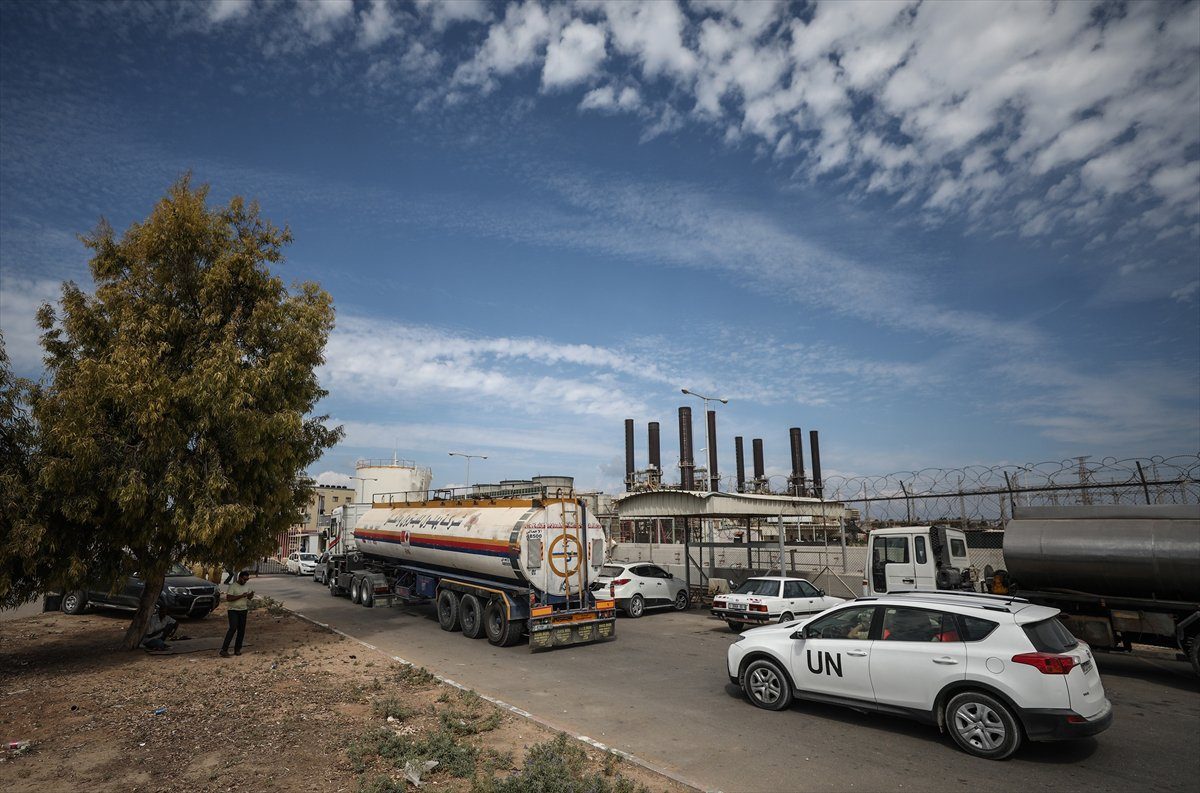Gaza has been suffering from an illegal Israeli embargo since 2006, which has placed over two million Palestinians under harsh conditions that were exacerbated during the latest offensive.
Israeli authorities reportedly prevented the entry of 25 trucks carrying Qatar-funded fuel into the Gaza Strip’s only power plant, Abdel Fattah Abu Musa, spokesman for the Ministry of National Economy in Gaza, told Al-Aqsa Voice radio on Sunday.
“The occupation’s decision to prevent the entry of fuel to the only power plant in Gaza is an intensification of the siege,” said Abu Musa, describing this as a “war crime”.
Later on Sunday, Rami Abu Al-Rish, Director General of Trade and Crossings at the Ministry of Economy in Gaza, told the Palestinian radio that there are “promises to resume the entry” of the trucks on Monday through the Kerem Shalom commercial crossing.
In June, Qatar-funded fuel entered the Gaza Strip to power the city’s only electricity station for the first time since the May ceasefire, under a UN framework per an agreement between the UNOPS [United Nations Office for Project Services] and Doha.
Speaking on condition of anonymity, an Israeli defence ministry official claimed the fuel trucks were stopped due to failure by a Palestinian Authority’s body in charge of coordinating with Tel Aviv to inform of the Israelis of the entry.
“As soon as the Palestinians properly coordinate with us, the fuel will enter,” the official said.
This claim was later dismissed by two Palestinian officials in Gaza, who said they were not informed about such issues and denied responsibility of overseeing the entry of the fuel into the city as the coordination remains between Qatar, the UN and Israel.
Israeli media said that Qatar and the UN also declined to comment on the latest updates.
Qatar’s envoy to Gaza returns as delivery of monetary aid edges closer: reports
The Gulf state has been providing Gaza with aid over the years to alleviate the suffering of millions under Israeli siege.
In February, Qatar confirmed plans to establish a natural gas pipeline to double Gaza’s daily electricity supply, increasing electric power to 400 megawatts—twice the current amount.
The project was expected to be completed in two sections – one in the besieged Gaza Strip and the other in an area occupied by Israel. Two contracts were also signed for the pipeline project – one for the purchase of gas between the PA and Delek Company and another for installing the pipelines.
However, there have been no updates regarding the construction of the pipeline since the deadly 11-day Israeli offensive on Gaza in May, where at least 250 Palestinians were killed.
Shortly after the Qatar and Egypt-brokered ceasefire, Qatar pledged a $500 million donation to reconstruct the the strip. The donation was also met with hurdles on the Israeli side which demanded the transfer of aid via the Palestinian Authority [PA] or international organisations.
Tel Aviv has refused to allow the transfer of millions of dollars, claiming it would fall into the hands of Hamas, which runs the enclave. Senior Qatari officials as well as Hamas leaders have refuted those claims.
Limited electricity
Gazans, illegally embargoed by Israel since 2006, have been living with at least eight hours of blackout per day, placing them under harsh conditions that only worsened during the latest offensive.
According to the Israeli Information Center for Human Rights in the Occupied Territories [B’tselem], the entire population in Gaza requires at least 600 megawatts of electricity to ensure that it gets a 24/7 supply.
However, Palestinians living in the besieged area only receive 180 megawatts, of which 120 are directly from Israel. These are carried through 10 power lines and 60 others from Gaza’s power plant, also funded by Qatar.
As a result of the limited access, residents receive electricity in eight-hour rotations and suffer in the heat with no power, sometimes for up to 12 hours.
Israel also withholds fuel from the power plants, further limiting electricity to millions of residents and hospitals that are already struggling with the global coronavirus health crisis.
Last year, Israel stopped the fuel supply by closing the crossings with Gaza, causing the power plant to shut down within at least a week. This further reduced the strip’s power supply until it was re-opened in September.
Follow Doha News on Twitter, Instagram, Facebook and Youtube







